When David Owen and Jim Holbeck filed their lawsuit to declare Amendment C unconstitutional, I figured that, if the Second Circuit Court acted with the same alacrity with which the Sixth Circuit Court heard arguments and declared Amendment A unconstitutional in the winter of 2021, we could get a ruling by April 8—this Friday!—just in time to strike Amendment C from the primary ballot.
But 78 days later, we’ve heard nothing new on this case. What gives?
It turns out that, apparently tired of losing cases related to ballot measures in court, the Attorney General’s office has decided it can refuse to respond to lawsuits and delay them indefinitely. At least that’s what the latest filing from the plaintiffs challenging Amendment C say is happening. Roll with me through the details:
On January 18, 2022, the plaintiffs filed their complaint against defendants Secretary of State Steve Barnett and Minnehaha County Auditor Ben Kyte and their summons in the Second Circuit Court. The plaintiffs emailed copies of the complaint, summons, and an admission of service form to the defendants—in Barnett’s case, to the Attorney General, who represents state officers in court. The plaintiffs formally served those documents to the defendants via certified mail. In Barnett’s case, it might have been fun to serve in the papers in person, marching up the steps of the Capitol and into Barnett’s office and dropping the papers on his desk with a satisfying thud! However, SDCL 15-6-4(d)(6) doesn’t allow such truly personal and dramatic service; instead, statute requires that “personal service” on a state officer take place via certified mail to the Attorney General:
The summons shall be served by delivering a copy thereof. Service in the following manner shall constitute personal service:
…(6) If the action is against a state officer, employee or agent arising out of his office, employment or agency, a copy of the summons and complaint shall be mailed, certified mail, postage prepaid to the attorney general together with an admission of service and a return envelope, postage prepaid, addressed to the sender. The executed admission of service shall be filed by the sender in accordance with § 15-6-5(d)… [relevant text of SDCL 15-6-4(d), effective 2005.02.25].
According to the plaintiffs, Auditor Kyte got the documents told the plaintiffs, yup, got ’em! the next day, on January 19. The plaintiffs were able to file Kyte’s admission of service in court on January 31.
But the Attorney General didn’t call on January 19, or January 20, or for a whole nother month after that. Finally, on February 21, after 34 days of radio silence from Pierre, the plaintiffs’ lawyer, Brendan Johnson, emailed and asked, WTH?
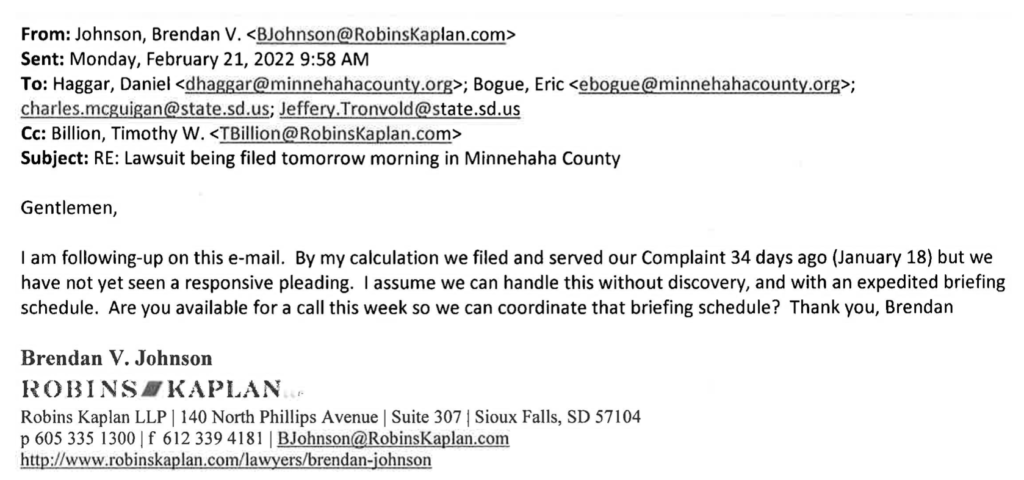
Deputy State’s Attorney Eric Bogue responded on Kyte’s behalf after lunch and said he’d coordinate with the Deputy AGs Charles McGuigan and Jeffrey Tronvold on responding. The AG’s office didn’t respond until the next day, late in the afternoon, with this curious response:
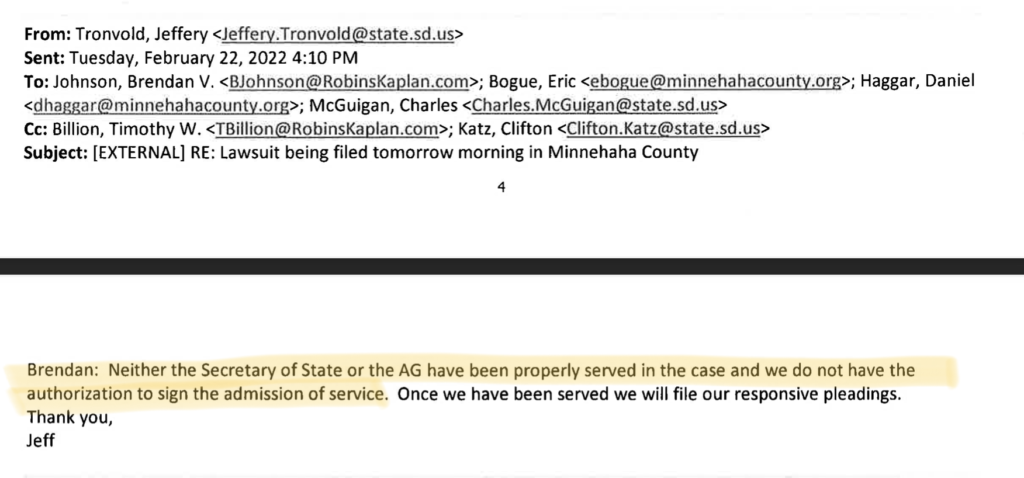
Johnson replied three minutes later:

Tronvold replied 20 minutes later, “No one from the state admitted service.” Johnson replied three minutes later trying to get clear on whether Tronvold was saying the AG’s office had not received the clearly delivered emails and certified mail. Twelve minutes later, Tronvold clarified the game the state was playing:
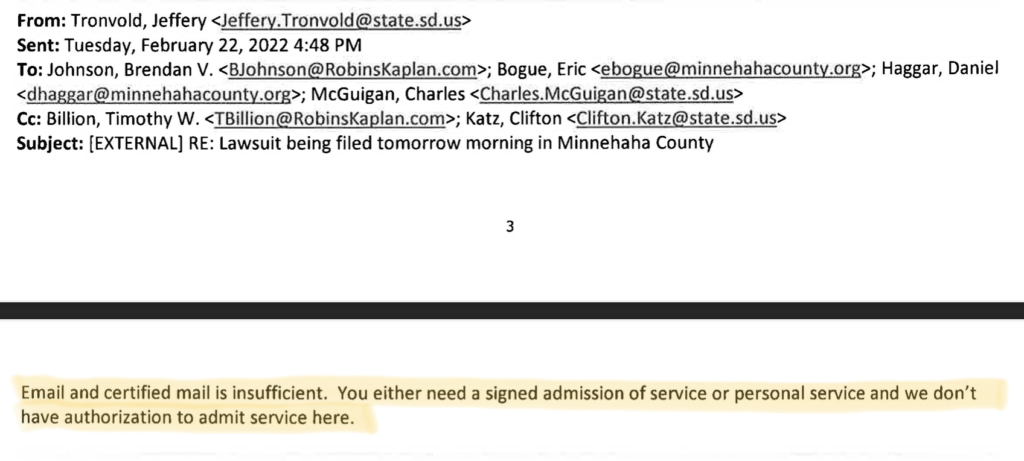
Johnson evidently needed seven minutes to respond to this curveball. He checked the statute cited above and replied:

29 minutes later, Tronvold repeated his claim that doing exactly what SDCL 15-6-4(d) defines as personal service on a state officer—sending the summons by certified mail—”is not sufficient to serve either the SOS or the AG.” Tronvold added that SDCL 15-6-4(d)(6) also requires the plaintiffs to file an executed admission of service… which, of course, the plaintiffs can’t do when the AG’s office refuses to admit service.
Johnson needed to step away from the computer and get some supper before responding to this stonewalling. That evening, Johnson replied by citing the relevant statute in full and the absurdity of the AG’s office saying it wouldn’t do anything until the plaintiffs filed a document that the AG’s office refused to sign:
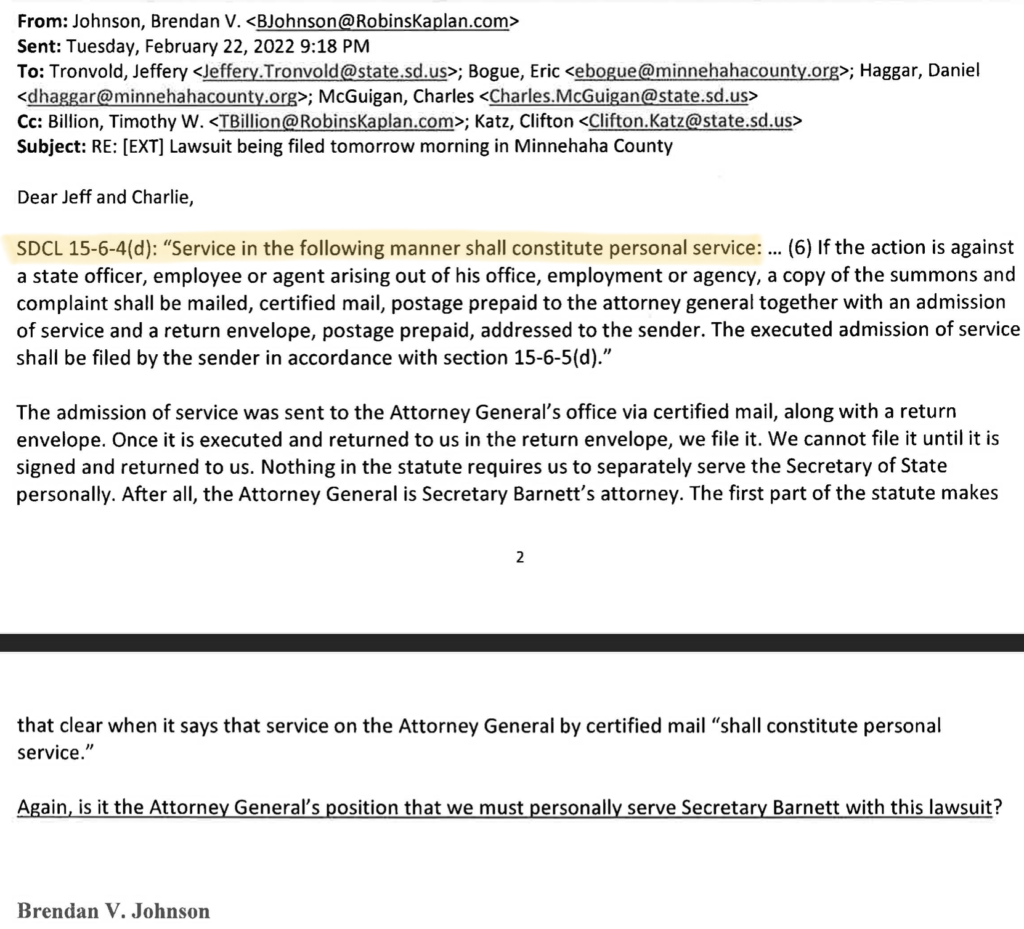
All parties slept on this before Chief Deputy Attorney General Charles McGuigan took over the stonewalling:
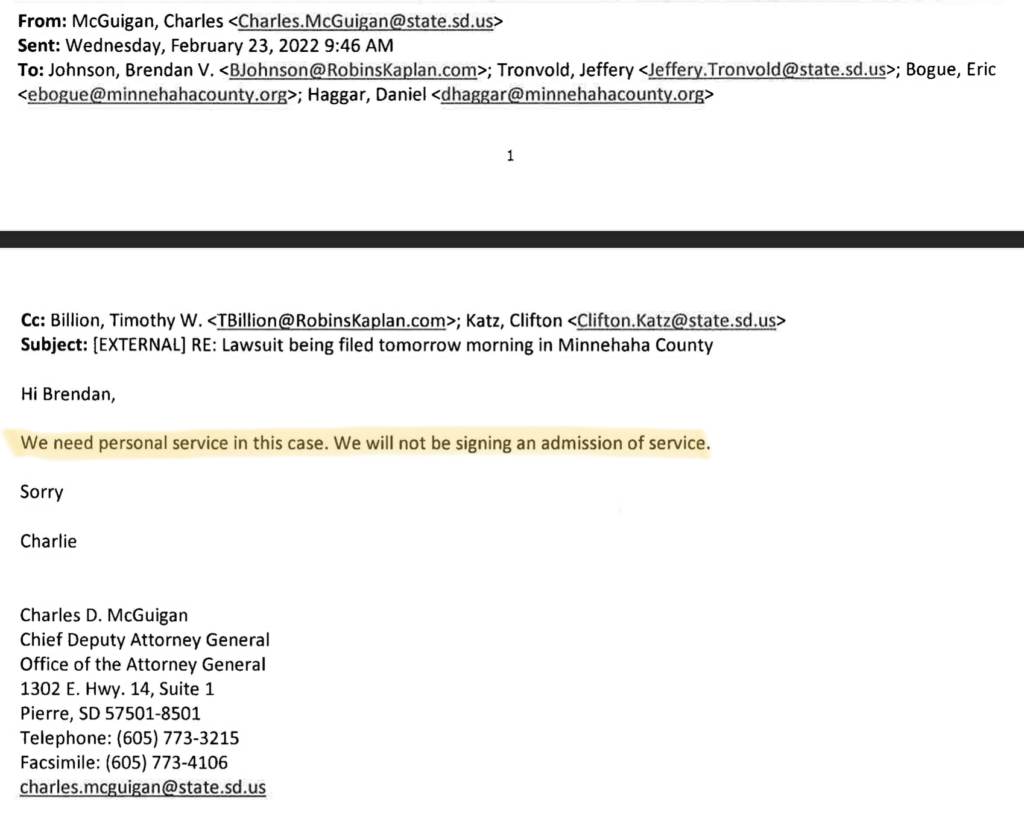
Probably wondering if he was reading the wrong statute or reading the right statute wrongly, Johnson rubbed his eyes and pondered for 66 minutes before asking McGuigan to provide any possible legal or factual basis for refusing service conducted as prescribed by SDCL 15-6-4(d)(6). Twenty minutes later, McGuigan responded with neither such basis:
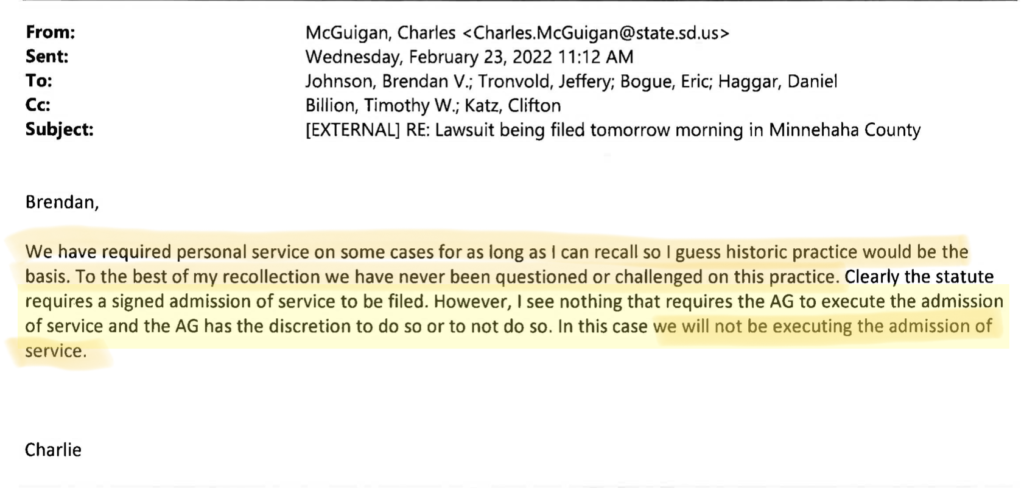
McGuigan’s response is a stunning assertion of arbitrary extra-legality. State defines “personal service” on a state officer solely as the summons delivered by certified mail to the Attorney General. But sometimes, on some cases, whenever he feels like it, the Attorney General can waive that statute and demand service by different means (hand delivery? carrier pigeon? skywriting?) And no matter what means a plaintiff may use to serve the defendants, the A.G. reserves the right to pretend the service never happened.
Preferring the rule of law to the rule of McGuigan, the plaintiffs generously gave the A.G. six more weeks to respond to the properly served summons. Their generosity went unrewarded.
Thus, yesterday, the plaintiffs asked the Second Circuit Court for default judgment. SDCL 15-6-12(a) requires defendants to respond “within thirty days after service of the complaint on the defendant….” Defendants have not responded. (Kyte admitted service, but apparently the state’s recalcitrance has prevented Kyte from responding in court.) Absent any response, plaintiffs have the right to request and the court has authority to grant default judgment—in this case, to declare Amendment C unconstitutional and enjoin its appearance on the ballot or its enactment without hearing a single argument.
The most important passage in the plaintiffs’ argument for default judgment is the plaintiffs’ response to the state’s arbitrary refusal to acknowledge the service legally executed by the plaintiffs. The response actually comes from the state’s own argument against one Clayton G. Walker (yes, this guy! the same Clayton Walker who, in 2014, failed to get on the ballot to run for U.S. Senate because he faked signatures on his petition!), who tried to sue Barnett and Secretary of Labor Marcia Hultman for not allowing him to use electronic petitions to avoid covid (actually not a bad idea!) and get on the U.S. Senate ballot in 2020. The Attorney General’s office got that suit tossed because Walker tried serving Barnett the way McGuigan is asking Owen and Holbeck to serve Barnett:
The language of this statute is clear: service of process on a state official by certified mail is personal service. Indeed, Secretary Barnett and the Attorney General recognized the plain reading of this statute when they recently took a directly contrary position to their stated position here before a federal court. In Walker v. Barnett, the plaintiff attempted to serve a summons on Secretary Barnett by having U.S. Marshals deliver it in person to Secretary Barnett’s office. No. 4:20-CV-04059-KES, 2020 WL 5642297, at *3 (D.S.D. Sept. 22, 2020), aff’d, 843 F. App’x 834 (8th Cir. 2021), cert. denied, 142 S. Ct. 871 (2022). Secretary Barnett argued that this in-person service was improper because it did not comply with the requirements of SDCL § 15-6-4(d)(6). Def. Br. at *1, Walker v. Bennett, 4:20-CV-04059-KES (D.S.D. June 17, 2020) (ECF No. 32), 2020 WL 6577957. The court agreed, explaining that to serve Secretary Barnett, the plaintiff was required to “serve the South Dakota Attorney General by sending him a copy of the summons and complaint by certified mail.” Walker, No. 4:20-CV-04059-KES, 2020 WL 5642297, at *2 [emphasis mine; Owen and Holbeck v. Barnett and Kyte, Plaintiffs’ Brief in Support of Motion for Default Judgment, Case # 49CIV22-000167, 2022.04.05, p. 4].
The state has used SDCL 15-6-4(d)(6) to get out of other lawsuits. Recall the EB-5 scandal: when Joop Bollen was playing lawyer to hide some of his EB-5 machinations, the state defended the Board of Regents from a lawsuit from California EB-5 firm Darley International by pointing out that Darley had failed to read South Dakota law and properly serve the Board of Regents through the Attorney General.
The plaintiffs challenging Amendment C read the law. They did exactly what the law says: personally serve a state officer by sending the summons via certified mail to the Attorney General. The state has said in past litigation that that’s exactly what the law says plaintiffs must do. Courts have agreed that the law says exactly that. The Attorney General cannot overcome the plain language of the law and the state’s and courts’ own reading of that law by invoking “historic practice” on “some cases.” This law identifies no exceptional cases and provides the state no discretion to do so.
The state has failed to respond to a legal summons, in a transparent attempt to delay this lawsuit and keep its Republican friends’ Amendment C on the June special election ballot. The court should not reward the state’s delay. The court should immediately issue default judgment for the plaintiffs and boot Amendment C from the ballot.
If the court hurries, it can still issue that judgment by Friday!
Politics in my home state has become so toxic watchers need hazmat suits just to withstand the sludge. Does it ever quit or the poisonous Big Sioux River the cleanest thing in South Dakota?
Well…it figures..if you have an excess of political power you use it to quash that which you find deviates from the Party’s myth of invincibility. Doesn’t matter if it comes from a vote of the people. The Party knows best.
Bold legal strategy. Unethically bold.
Yes, Ryan, it does take some weird sort of courage for the state’s top lawyers to ignore a legal summons, then, when called on their failure to respond, to tell the complaining party to submit their summons illegally. Such “courage” is facilitated by the one-party corruption to which Larry alludes, corruption that makes the Attorney General and the rest of The Club think they can act with impunity.
This is what 40-plus years of one-party rule creates: Government run by thugs.
Gary Cammack…..
“I’ll drink to that!”
Between the American oligarchy (including Former President Trump’s criminal syndicate) and my home state’s GOP rise above the law, I have no faith left in “rule of law.” Does anyone other than poor folks carrying an ounce of weed face a legal system holding them accountable for breaking the law?
where is konstitution krusader kristi? with our single subject rule under attack and our state’s konstitution in jeapordy, i would have expected her to get the paint roller out by now and prep for some teevee time to tell us how she’s gonna save us again from tyranny.
You expect less from magats and you get it.
They maybe figured they were going to loose either way, so…….. much less work to simply do nothing. Pays the same.
This kind of stuff isn’t new, though I’m surprised McGuigan is the one pulling it. He always struck me as pretty honest. I guess the inherent corruption in the Republican Party has gotten the best of him. This is the kind of extra-legal stuff the state pulled during the sewage ash scam. These kinds of extra-legal tricks bought the scammers time to haul all that sewage ash to South Dakota. They are just buying time to run out the clock.
Tronvold says he lacks authority to sign, admitting the state was personally served. His boss withheld authority. His boss is highly experienced McGuigan who says like a turnip “I guess historic practice would be the basis…. [in this case] we will not be executing the admission of service.”
Or Jason, the big boss, withheld authority. The Judge may have the power not withstanding, to scare Tronvold, sanction McGuigan and/or the fool Jason,
award punitive attorneys fees to Johnson should he desire to set his gentle person’s gloves down at the behest of his client, or threaten their license to practice law, and for wasting everybody’s time in bad faith; and now we will get to see how good lawyers mop up bad lawyers like Jason, Eastman and their corrupt Republican ilk. All brought to you on the taxpayers’ dollar by the profoundly incompetent Noem’s Republican administration.
Ryan, please cite the portion of the applicable ethics code violated?
McGuigan will never practice quality law again outside of the state after this stunt. Deputy AGs at the DOJ quit their jobs rather than smear themselves with the Republican horse sheit they call “governing” these days.
leslie – i think you mean relevant portions (plural). I think several other rules might apply, too, but here are some easy ones to show you.
South Dakota Codified Laws – Title 16 – Courts and Judiciary -Chapter 18 – Powers And Duties Of Attorneys
APPENDIX A – South Dakota Rules of Professional Conduct (excerpts):
Rule 3.1. Meritorious Claims and Contentions
A lawyer shall not bring or defend a proceeding, or assert or controvert an issue therein, unless there is a basis in law and fact for doing so that is not frivolous, which includes a good faith argument for an extension, modification or reversal of existing law.
Rule 3.2. Expediting Litigation
A lawyer shall make reasonable efforts to expedite litigation consistent with the interests of the client.
Rule 8.4. Misconduct
It is professional misconduct for a lawyer to:
(c) engage in conduct involving dishonesty, fraud, deceit or misrepresentation;
(d) engage in conduct that is prejudicial to the administration of justice;
You know, as a teacher and a mother of three in SD, I want so much for the future of South Dakota, my children, my students, than garbage like this.
South Dakota deserves better.
How can we turn the screws on this so a judge responds? Can someone file a complaint against the deputy for professional misconduct? If so, how does someone do that? Has this been reported to the SD State Bar Association? It seems to me that the AGs office has opened the door to further investigations and possible consequences based on this email string.
I am not sure that the Judge can order a default judgment. The remedy for Plaintiffs would seem to be seeking a writ of mandamus that requires the AG to comply with the statutory duty to sign the admission of service.
I tend to agree with Ryan that the AG and/or individual deputy AG involved are treading on thin ice. I don’t think it is a defense for a lawyer’s ethical violation to point out “I was only following illegal orders.”
The hapless Charlie McGuigan was, in my opinion after seeing him testify a dozen times in committees in opposition to cannabis-related bills, nothing more than a a buttboy for whomever told him what to do. Honest? To the extent that someone who has no idea what is going on can be honest, I guess.
BCB, if the court says it can’t render default judgment and instead requires the plaintiffs to seek a court order to force the AG to reply, wouldn’t the court be affirming the AG’s delaying tactics? It seems default judgment exists to deter exactly this sort of delay; why require further action from the plaintiffs, who have followed the law to the letter to obtain the required response from the defendants?
Trumpism has spread to the largest law firm in SD. The AG’s office. Their lies spread like, well…
“the virus for measles has the highest average R-naught value in the world at around 15-18, while the Omicron variant has a R0 value of 8-15, putting it in second place.”
Enough time wasted on bitter pills.
Cory, while your thought process makes perfect sense judges are limited by statutory language and are supposed to give all parts of a statute full effect. So the outcome here depends on how the court construes the “admission of service” language. The statute is mandatory, so it should be enforced. But deeming service simply based on proof of receipt of certified mail when there is no admission returned seems to make the statute redundant. If certified mail is enough to constitute service of the summons and complaint after some designated time period (which the statute apparently does not identify or limit) there would be no need for the additional admission of service requirement after that delay beyond the time limit. But if the admission is necessary to establish such service with no specific time limit, then technically the State has not been served until it returns the admission. And if the State hasn’t been served, then normally a default judgement cannot issue, absent some violation of a specific court order, such as mandamus.
Indeed, the AG has gamesmanship on its side. But if we can get McGuigan or Tronvold under oath and get them to say, yes, we received the documents, but we chose to interpret them not to constitute personal service and thus did not sign and return the admission of service form, would that establish that they have illegally ignored service?
Read the statue on service for me: am I right in saying that actions against state officers are the only ones that require the sender to file an executed admission of service signed by the summoned party, in this case the AG acting as counsel for the summoned party? If someone sues me personally and delivers the summons, there’s no form attached to the summons that I can withhold to delay the proceedings; my 30-day clock for default judgment starts the moment the papers are in my hand, right?
If that’s correct, then why does the A.G. get a unique mechanism—gross recalcitrance—by which to indefinitely delay any proceeding? Have we really written our law to give the state that unique and uncheckable power?
Giving framers of the law the benefit of the doubt: is there some good reason that we would want the state to be able to delay its response to a legal summons, that we would require that extra step of the admission of service that we apparently don’t require in legal action against any non-state actor?